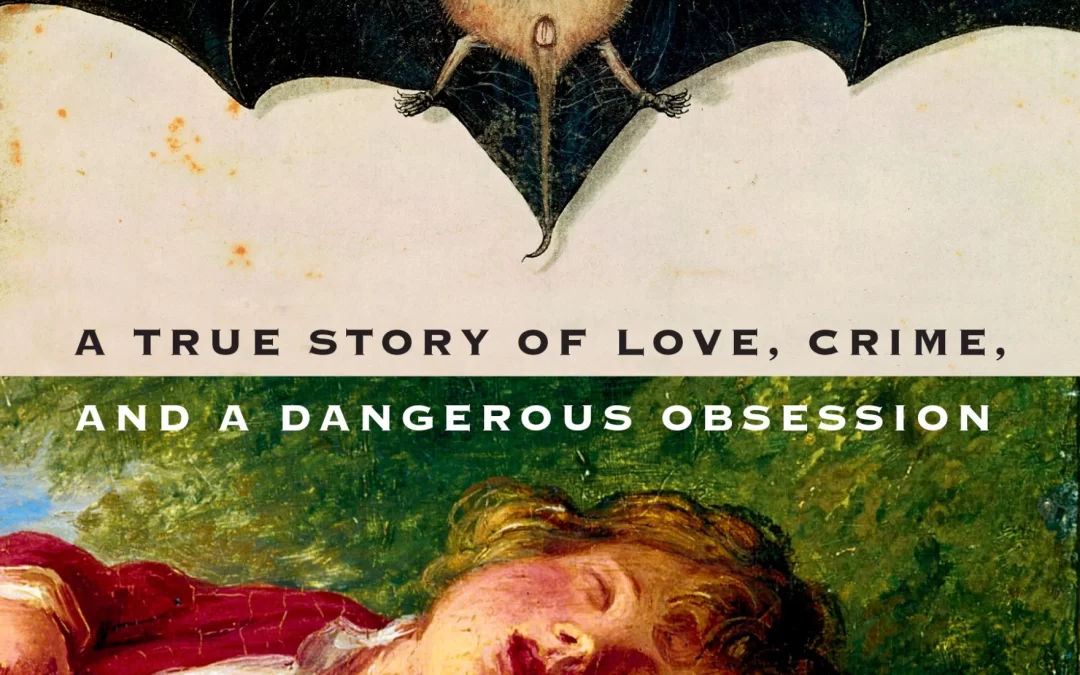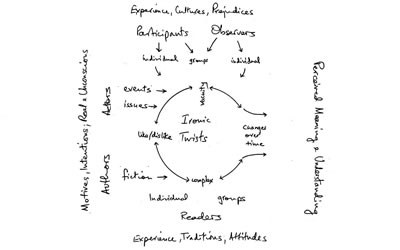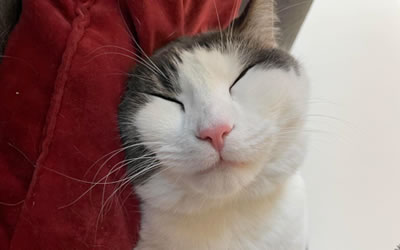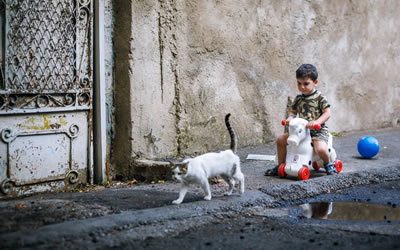When I was young, there was a bare patch under some tall and shady basswood trees (I called them ‘lollipop trees’, as that is what they looked like) where regular grass just didn’t want to grow. So, I started to play mud games with the hose. While my brothers were busy indoors, learning to play Chopin and read Dostoyevsky, I, with the more stunted intellectual development, worked with mud. Soon the Aswan dam was rising, and Abu Simbel was being dug from the banks. Sure, there were some accidents from poor construction, (and some deliberates, as I was mean), and thousands of ants in the cities downstream were drowned or washed away when the dam broke (or was opened)…but, little by little, the earthworks got bigger and bigger. It was annoying how the water had this irritating habit of seeping away overnight, meaning I had to refill it every day – but the sight, I tell you, was quite impressive. I even constructed a primitive ‘Nilometer’ (a twig constrained in a little pool) on the little Elephantine Island I created to measure the height of the inundation when I lifted the little gate on the dam.

Photo by: Ahmed Akacha
My father left me alone until he heard me organizing the neighbours’ children into work gangs to do shifts on expanding the pool, now becoming a lake, and decided to intervene when the back hoes from Esposito Landscaping started showing up, with their articulated dump trucks backing up onto our driveway…
But what did he do? Did he tell me I was killing the world – or even killing nice little ants? Did he just mandate no more fun, drop the tools, empty the dam, and tell me to come inside the house and sit in a hard backed chair and do long division sums?
No, he started by showing me little “shade grass seeds” – different types too – this could be spelt, he said, this barley, which made the bread the Pharoah’s soldiers carried, you know – and asked if he could plant a few crops in my fields, you know, to grow after the great inundations I had every day? Sure, I said! He even wanted to hear about my plans for the Step Pyramids further down the hill… Well, you can guess what happened. Soon the Hoover dam was nothing more than a berm with fine fescue and ryegrass, and hummingbirds hovered over the loose strife, fauns nibbled on the baby junipers, and rabbits gambled in what had been the Valley of the Kings….and I had moved onto to another project. And, I am sure, the ants were happy.
At the time, I was oblivious to the suffering of the ants. Of course, my father was likely more concerned about the water bill than the ants. But the parallels, contrasts, and ironies in this little world to ours today are all around us. And, worryingly, they are more sinister and odious as I am talking now about adults and governments that control the destinies of many – for many years to come. You see, Jonathan Swift in Gulliver’s Travels also uses metaphors of giants amongst the small, and the small amongst the large, to make some of the same arguments. Ants maybe Lilliputians, but the giants in our mud story do eventually make the land stable and safe for ants. As I watch, listen to, and read about the news in the world today, I am not convinced our politicians, or the politicians of our allies, are doing the same for us.
Jonathan Swift uses distortion and exaggeration to highlight events in his hero’s travels. But by how much are his travels really different from our lives? What, indeed, do we compare them to if we are trying to find the normal? We may laugh, or worry, when we look at ourselves in light of what we see in Gulliver’s Travels. In a normal world, where most boys are boys, is it normal for them to go to a girl’s bathroom – especially at puberty? Ironically, we become less vulnerable to the sources of unease, untruthfulness and misinformation if we can employ the ironic perspective. We can escape our trap of indifference or hopelessness – or false satisfaction – if we can change our perspective. Morality arises from self-reflection. Common sense can arise from that. The richness of our understanding is improved; truth, always oblique, can be recognized more easily. Without irony, beauty maybe relative; meaning can become relative; lies and dishonesty relative; and truth becomes even more oblique – or maybe lost. Individual humans become insignificant, and man becomes powerless. What is sordid and brutal can rule and torment us.
In Swift’s world, the ants are little people called Lilliputians, and they are mean and nasty, morally corrupt, hypocritical, deceitful, jealous, and filled with greed and ingratitude — they are, in fact, completely human! But Swift’s vision is not of a bitter misanthrope. He points out that the intellectually correct Houyhnhnms Gulliver meets later are boring, have no fun, no passion and hence no life. Lilliputians (and the beastly Yahoos Gulliver also meets later) are mortal, and ridiculous, but they have an immortal soul as they are striving for something better. All is not lost. But this is as a collective whole, not the individual man or beast. What we Yahoos, Lilliputians – and ants – need is an honest leader.
Whether it is in Swift’s time, or now, politicians can have questionable morals; repeatedly denying, lying, ignoring, and cheating. We all know that some are hypocrites. It is easy to see that we fall for them time and time again. Some of mankind’s mistakes are so glaringly obvious you wonder how it could have happened. But it did. Germany fell for Adolf Hitler’s madness, his mass murders and his warmongering. Mein Kampf was published in 1925 and 1926. Yet Germans did not think critically about his policies until it was far too late. Was Hitler, what we all now see as that unspeakably evil mass murderer, to the average German in the 1930s, like my father was to me?
Hindsight suggests he was. While the years have allowed my views of my father to stand, by 1945 Germans had much to rue. While a child may be forgiven for not employing critical thinking, surely adults can be held to a higher standard?
Let’s look at our country. Of course, in 2023, we are not talking about communists and Jews being the root of our problems. But we do read about climate change, the great Covid panic and the need for corrective policies to right past wrongs against certain minorities. One such wrong is our governments’ treatment of our indigenous peoples.
But the irony is, what have our governments done to help address the root problems of alcoholism, familial abuse, crime, and poverty, amongst our native peoples? It hasn’t been easy marrying the disparate cultures of our indigenous peoples to our contemporary society. If the government says it cares, but it does little to help individuals, how does this help? Lowering flags for unmarked graves is mere showmanship; ironically, it distracts people from the issues of why governments, including our current Prime Minister’s father, were so bad to native peoples in the past and avoids dealing with what they are doing now to actually help them. For years our governments have trivialized our native people’s suffering, and, by continuing to do nothing substantive, it prolongs this injustice. It is all a pretense to avoid help.
Thus, it could be argued that we are not at all far from the distortions caused by the types of propaganda that past tyrants and their ideologies promulgated. When we see we are being played, we become like Gulliver when he is amongst the giant Brobdingnagians. A weeping cancerous sore on a giant’s arm not only overwhelms tiny Gulliver with its putrid smell, but it becomes a swampy trap; an enormous fly’s faeces and spawn on Gulliver’s food becomes a monstrous impediment. All of a sudden, a modern politician’s ability to say one thing to the media – let’s say the media parrots that he is “caring” – falls apart when we realize that he (let’s continue to say he is a “he”) is not at all caring.
No normal Canadian would refuse to meet a sizeable minority of voters who had a peaceful message and who came to Ottawa to protest lawfully. No normal Canadians would think they are racists and misogynists. No normal Canadians would freeze their bank accounts and pass the Emergencies Act. But timing and the heat of the moment is important. No normal Canadian, if asked now, would say the unvaccinated against Covid were racists, misogynists, and extremists. Now, the normal Canadian thinks this is not right. Would the normal Canadian have said this at the height of the pandemic? The passage of time has changed the view of many. All of a sudden, the giant fly with its gargantuan faeces and spawn reminds us just what the lack of critical thinking can do to our judgement. The normal Canadian would like to think that he knows what is reasonable, plausible, and acceptable – but if we can change our minds so quickly in such a short time, are we not closer than we would like to think we are to the mindset of prewar Germans, idolizing Adolf Hitler?
The fact is, it is easy to be extreme and unreasonable in our judgements. I guess we are Yahoos. If we ignore the ironic perspective, which is part of critical thinking, we incorrectly oversimplify life. The gulf between Gulliver’s world and ours is, worryingly, not far apart.
Perhaps that is the whole point of Gulliver’s Travels. We see Jonathan Swift as a Dean in a cathedral, God’s vicar on earth, looking after his parishioners. We can see Gulliver’s adventures through God’s eyes, Swift’s eyes and then through Gulliver’s eyes. After everything, we see that the Yahoos aren’t completely bad. We are human, and not perfect, but we feel the moral imperative to improve – just like the ants do! Like Yahoos, we are exuberantly hopeful.
But we need, frankly, a government to act like my late father, who not only had humanity, but patience, honesty, and an understanding of what we need. Are we damned, forever, to be governed by what we all have come to expect – self-serving liars and cheats? Or can we critically analyze what we are told – before it is too late – so that we can avoid the mistakes so many of us – like those uncritical people in Nazi Germany – have made before?








